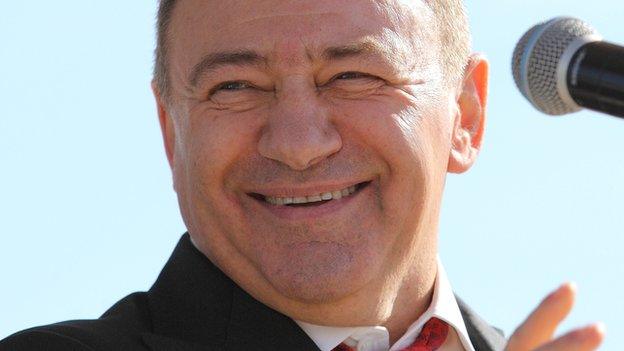Russia hits West with food import ban in sanctions row
- Published
Steve Rosenberg visits a Moscow supermarket to see if the sanctions will affect shoppers
Russia is imposing a "full embargo" on food imports from the EU, US and some other Western countries, in response to sanctions over Ukraine.
Prime Minister Dmitry Medvedev said it would include fruit, vegetables, meat, fish, milk and dairy imports.
Australia, Canada and Norway are also affected.
Elsewhere, Nato chief Anders Fogh Rasmussen said Ukraine's freedom and future were "under attack," promising support against Russian "aggression".
The latest developments come during heightened tensions between Russia and the West over Ukraine, where heavy shelling was reported in the eastern rebel stronghold of Donetsk on Thursday.

Russian voices: Yuri Alexandrov, St Petersburg
I'd being living in the UK with my family for quite a while, but we decided to go back to Russia some time ago. These sanctions mean not much at all. Most day-to-day food can be sourced locally and most of the time we buy locally produced meat and vegetables anyway.
I would probably miss milk products from Finland but it's not the end of the world. We used to have quality milk from local factories.
I really hope those sanctions show to Europe that Russia and Western Europe have much more in common rather than our overseas friend, the US.

Pro-Russian separatists have shot down a Ukrainian Mig-29 fighter jet near Yenakiieve, in Donetsk region, Ukrainian "Anti-Terrorism Operation" spokesperson Olexiy Dmytrashkivskyi told the BBC.
An airman managed to eject and is currently being sought, he added.
Airspace ban
In addition to the food imports embargo, Russia is banning Ukrainian airlines from transit across its territory, Mr Medvedev said in televised comments to the government.
The Russian government is also considering banning transit flights for EU and US airlines in retaliation for sanctions over Ukraine, he said.
Barring airlines from Siberian airspace would significantly increase costs and flying time for many jets bound for Asian destinations.
EU food exports to Russia last year, external were worth 11.8bn euros (£9bn; $15.8bn) while US food exports to Russia were worth 972m euros (£772m; $1.3bn).
Russia was the EU's second-biggest market for food exports (10% of total), after the US (13%).
The European Commission said the Russian embargo was "clearly politically motivated". It is considering how to respond.
Western governments accuse the Kremlin of fomenting the unrest in eastern Ukraine by supplying weapons and expertise to the pro-Russian separatists.
Nato's Anders Fogh Rasmussen, speaking during a visit to Kiev on Thursday, called on Russia to stop supporting the rebels and pull back its troops from Ukraine's border.
Nato Secretary-General Anders Fogh Rasmussen speaks to David Stern about Russia's military build-up and the downing of flight MH17
Russia "should not use peace-keeping as an excuse for war-making", he is quoted by Reuters as saying.
Last month the EU and US tightened sanctions on Russia, with Brussels applying restrictions to key sectors of the economy as well as individuals. The first round of sanctions came after Russia annexed Ukraine's Crimea region in March.
The crash of Malaysia Airlines Flight MH17 last month, killing 298 people, exacerbated tensions between the West and Russia, as the separatists in eastern Ukraine were widely blamed. It is strongly suspected that a Russian missile system was used to down the jet.
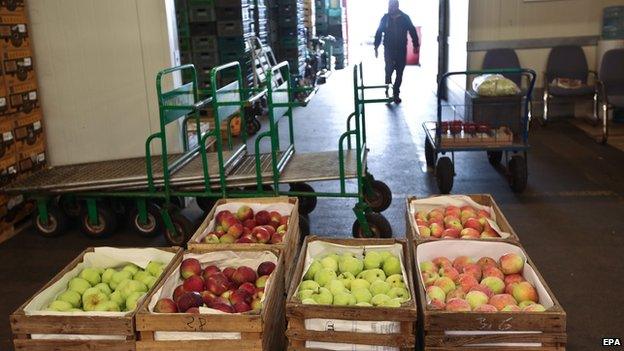
Apples in Warsaw: Russia has been a major export market for Polish apple growers
Dutch investigators have suspended work at the crash site, saying it is too dangerous, and Ukrainian forces battling the rebels in the area say their ceasefire has now ended.
Resignation
There has been more heavy shelling on the outskirts of rebel-held Donetsk as Ukrainian troops edge closer to the city. Several civilian deaths were reported.
In a separate development, the political leader of the separatists in Donetsk announced that he was resigning his position on Thursday.
Alexander Borodai, a Russian national, said a local field commander named Aleksander Zakharchenko would take over his role. Mr Borodai has vowed to continue working in Donetsk.
Meanwhile, there were scuffles in the heart of the Ukrainian capital Kiev when municipal workers started dismantling tents used by protesters.
Acrid smoke from burning tyres billowed over Independence Square, where protesters first began camping last November, in the huge "Maidan" rallies which eventually toppled President Viktor Yanukovych.
Protesters in Kiev wearing balaclavas have set fire to tyres, as David Stern reports
Sourcing food in Russia
President Vladimir Putin said on Wednesday that the food embargo would take immediate effect and last for a year.
Mr Medvedev ordered the agriculture ministry and producer organisations to find ways to boost Russian farm output, external in order to prevent price rises for consumers.
The Russian authorities say they are confident the supermarket shelves will not be left empty - they are searching for alternative suppliers in South America, Turkey and China.
But filling the gap will not be easy, the BBC's Steve Rosenberg reports from Moscow. It is estimated that in big cities, like Moscow, more than 60% of food in the shops is imported.
Researchers at Capital Economics say "far and away the most vulnerable to the Russian sanctions is Lithuania, where exports of the banned products to Russia are equivalent to 2.5% of GDP".
But they add that "the biggest loser from the import ban looks set to be Russia".
The major food exporters to Russia last year were, in order of importance: Belarus ($2.7bn), Brazil ($2.4bn), Ukraine ($1.9bn), Germany ($1.8bn) and Turkey ($1.68bn), Reuters news agency reports.

Fact box: Russian food imports
Russia was the EU's second-biggest market for food exports (10% of total), after the US (13%)
In 2013 the biggest food sector in EU exports to Russia was cheese and curd, followed by pork, then alcoholic drinks, then apples, pears and quinces
Western exports of baby food and pet food to Russia are not on the sanctions list
Russians are not barred from buying Western food abroad, within customs limits
Russia banned all fruit and vegetable imports from one of its most vocal critics, Poland, in July
It imposed a ban on pig and pork imports from the EU in January
Various bans on food imports from Ukraine and Moldova are already in force

Steve Rosenberg explains the history of Russian culinary diplomacy
- Published7 August 2014
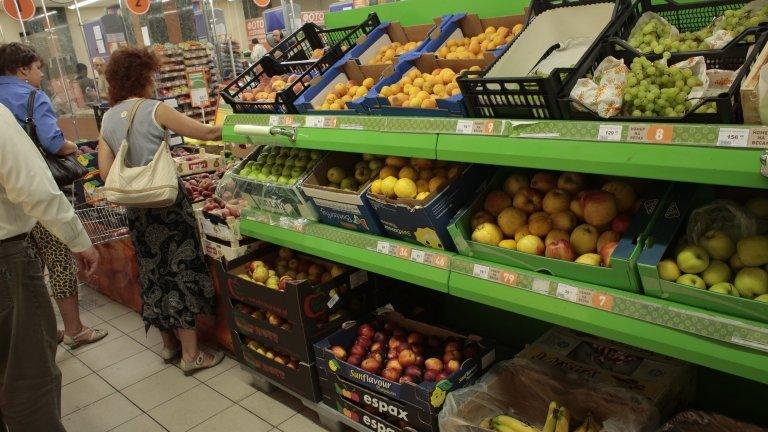
- Published1 August 2014
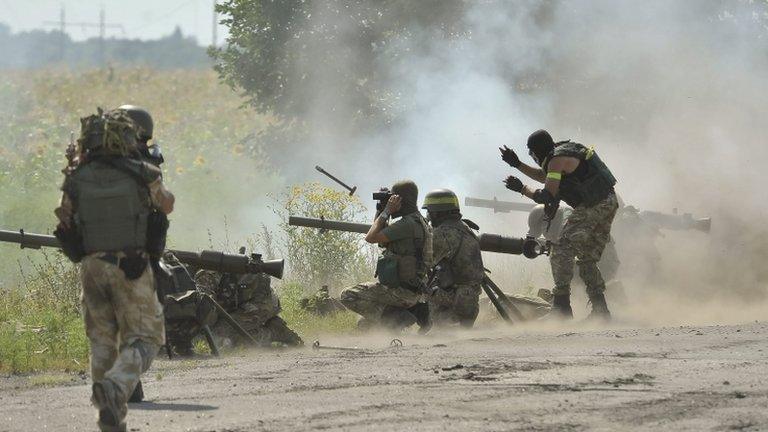
- Published30 July 2014
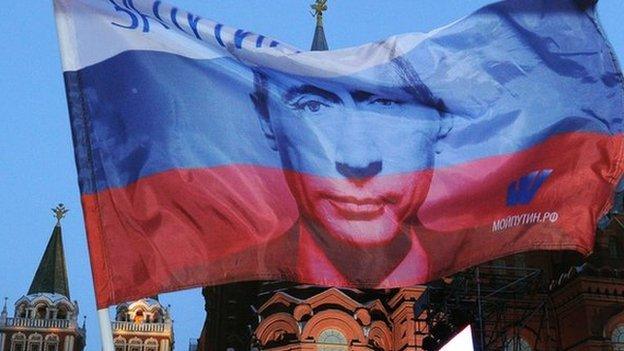
- Published1 August 2014
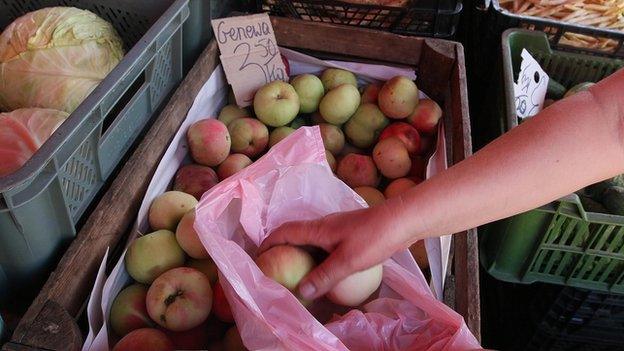
- Published31 July 2014
